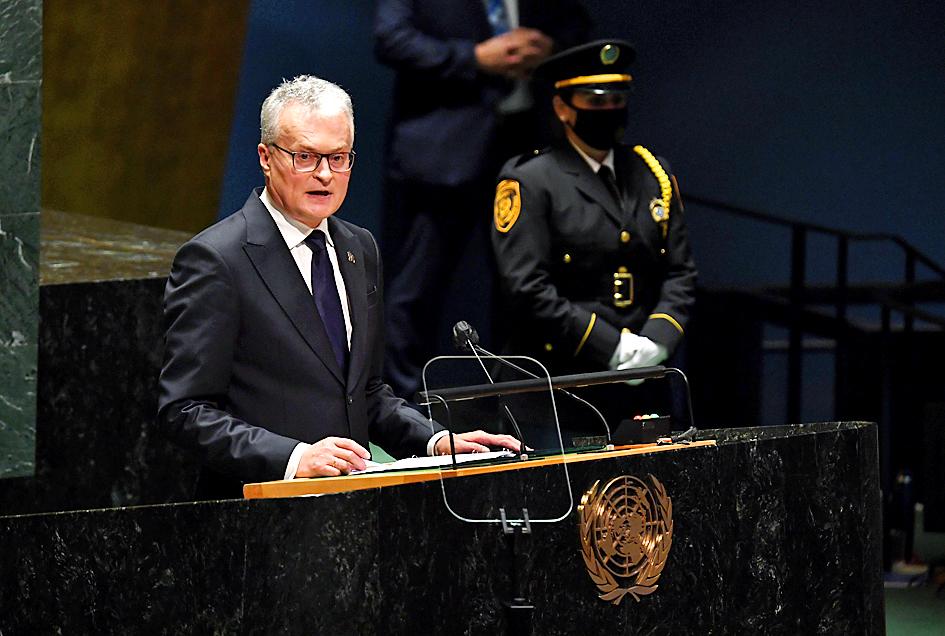Lithuania on Wednesday announced that it would donate a second batch of 235,900 doses of AstraZeneca PLC’s COVID-19 vaccine to Taiwan in a gesture that reflects the warm ties between the two nations.
The shipment is scheduled to arrive in Taiwan next month. The eastern European country’s first donation of 20,000 AstraZeneca doses arrived in Taiwan on July 31.
Lithuanian Prime Minister Ingrida Simonyte said in a statement that the latest donation was part of her country’s efforts to assist other countries in the fight against the COVID-19 pandemic.

Photo: EPA-EFE
“Global vaccines equity and solidarity are crucial in the fight against the COVID-19 pandemic, which, unfortunately, continues to disrupt the lives of people and countries around the world,” she said.
The Taipei Mission in the Republic of Latvia, which also promotes relations with Lithuania, wrote on Twitter on Wednesday: “Even though this donation seems to be another manifestation of virtuous circle, we are still most grateful for Lithuanian double generosity.”
In Taipei, Presidential Office spokesman Xavier Chang (張惇涵) on Wednesday night said that Taiwan appreciates Lithuania’s solid support, despite the distance between the two nations.
“The warm friendship between diplomatic partners knows no borders,” he said.
This second donation of COVID-19 vaccines again displays Lithuania’s love for democracy, and its strong and warm support for diplomatic partners, Chang said.
The “circle of good” between the two nations would definitely overcome the challenges posed by the pandemic, he added.
The Ministry of Foreign Affairs said in a statement late on Wednesday that a trade delegation being organized by the government plans to visit three eastern European countries next month, including Lithuania, to explore bilateral commerce and investment opportunities.
The two nations are set to reciprocate representative offices by the end of this year in a show of solidarity between democracies, it said.

CHAOS: Iranians took to the streets playing celebratory music after reports of Khamenei’s death on Saturday, while mourners also gathered in Tehran yesterday Iranian Supreme Leader Ayatollah Ali Khamenei was killed in a major attack on Iran launched by Israel and the US, throwing the future of the Islamic republic into doubt and raising the risk of regional instability. Iranian state television and the state-run IRNA news agency announced the 86-year-old’s death early yesterday. US President Donald Trump said it gave Iranians their “greatest chance” to “take back” their country. The announcements came after a joint US and Israeli aerial bombardment that targeted Iranian military and governmental sites. Trump said the “heavy and pinpoint bombing” would continue through the week or as long

TRUST: The KMT said it respected the US’ timing and considerations, and hoped it would continue to honor its commitments to helping Taiwan bolster its defenses and deterrence US President Donald Trump is delaying a multibillion-dollar arms sale to Taiwan to ensure his visit to Beijing is successful, a New York Times report said. The weapons sales package has stalled in the US Department of State, the report said, citing US officials it did not identify. The White House has told agencies not to push forward ahead of Trump’s meeting with Chinese President Xi Jinping (習近平), it said. The two last month held a phone call to discuss trade and geopolitical flashpoints ahead of the summit. Xi raised the Taiwan issue and urged the US to handle arms sales to

BIG SPENDERS: Foreign investors bought the most Taiwan equities since 2005, signaling confidence that an AI boom would continue to benefit chipmakers Taiwan Semiconductor Manufacturing Co’s (TSMC, 台積電) market capitalization swelled to US$2 trillion for the first time following a 4.25 percent rally in its American depositary receipts (ADR) overnight, putting the world’s biggest contract chipmaker sixth on the list of the world’s biggest companies by market capitalization, just behind Amazon.com Inc. The site CompaniesMarketcap.com ranked TSMC ahead of Saudi Aramco and Meta Platforms Inc. The Taiwanese company’s ADRs on Tuesday surged to US$385.75 on the New York Stock Exchange, as strong demand for artificial intelligence (AI) applications led to chip supply constraints and boost revenue growth to record-breaking levels. Each TSMC ADR represents

Pro-democracy media tycoon Jimmy Lai’s (黎智英) fraud conviction and prison sentence were yesterday overturned by a Hong Kong court, in a surprise legal decision that comes soon after Lai was jailed for 20 years on a separate national security charge. Judges Jeremy Poon (潘兆初), Anthea Pang (彭寶琴) and Derek Pang (彭偉昌) said in the judgement that they allowed the appeal from Lai, and another defendant in the case, to proceed, as a lower court judge had “erred.” “The Court of Appeal gave them leave to appeal against their conviction, allowed their appeals, quashed the convictions and set aside the sentences,” the judges